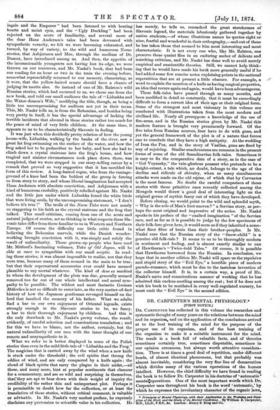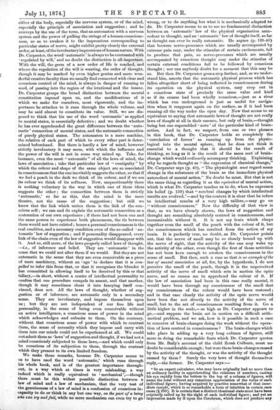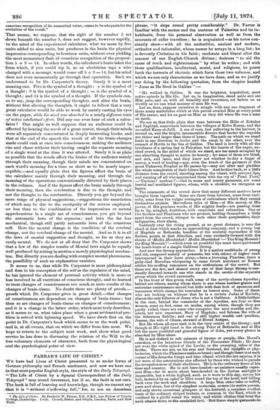DR. CARPENTER'S MENTAL PHYSIOLOGY.*
[FIRST NOTICE.]
DR. CARPENTER has collected in this volume the researches and systematic thought of many years on the relations between the mind and its organism, and on the application of the conclusions arrived at to the best training of the mind for the purpose of the proper use of its organism, and of the best training of the organism to make it a suitable instrument for the mind. The result is a book full of valuable facts, and of theories sometimes certainly true, sometimes disputable, sometimes in our opinion erroneous, but always worth attentive considera- tion. There is at times a good deal of repetition, under different heads, of almost identical phenomena, but that probably was almost inevitable, considering the very fine line of demarcation which divides many of the various operations of the human intellect. However, the chief difficulty we have found in reading the book is to follow Dr. Carpenter in his doctrine of ' automatic' mentaljoperations. One of the most important words which Dr. Carpenter uses throughout his book is the word automatic,' by which he expresses the involuntary character of the organic laws, • Principles of Mental Physiology, with their Application to the 2Vatinteg and Disci- pline of Me Mind, and the Study of its Morbid conditions. By William B. Carpenter, M.D., LL.D., FAX., 8:o. London: Henry B. King and Co. either of the body, especially the nervous system, or of the mind, especially the principle of association and suggestion ; and he conveys by the use of the term, that an automaton with a nervous _ system and the power of pulling the strings of a human conscious- ness, so as to awaken it to the impressions corresponding to particular states of nerve, might exhibit pretty closely the external order, at least, of the involuntary impressions of human nature. With Dr. Carpenter, the word automatic' is always to be contrasted with 'regulated by will,' and no doubt the distinction is all-important. With the will, the germ of a new order of life is reached, and where the regulation of the will is wanting, the order of thought, though it may be marked by even higher genius and more won- derful creative faculty than we usually find connected with clear and conscious control of the mind, is always in danger of running to seed, of passing into the region of the irrational and the insane. Dr. Carpenter grasps the broad distinction between the mental constitution imposed upon us, and the modifications of it which we make for ourselves, most vigorously, and the im- portance he attaches to it runs through the whole volume, and may be said almost to constitute its value. Still, we are dis- posed to think that his use of the word ' automatic ' as applied to mental states, is essentially defective ; and we doubt whether he has ever apprehended the great difference between the ' auto- matic' connection of mental states, and the automatic connection of purely physical states. The automaton is a mere machine, the relation of each part of which to every other part is deter- _ mined beforehand. But there is hardly a law of mind, however strictly involuntary it may seem, with which the influence and the power of the will is not in some way mixed up. Take, for instance, even the most " automatic " of all the laws of mind, the laws of association ; take that particular law of " contiguity" by which the colour and shape of the same object are so associated in consciousness that the one inevitably suggests the other, so that if we feel a peach in the dark we think of its colour, and if we see its colour we think of its softness. Now, unquestionably there is nothing voluntary in the way in which one of these ideas suggests the other ; the connection between them is strictly ' automatic,' so far as this, that the mind is the mere theatre, not the cause of the suggestion ; but still we know that the link which unites them is the link of the con- scions self ; we can and do explain the automatic connection as a restoration of our own experience ; if there had not been one and the same person to experience both phenomena, the tie between them would not have existed ; hence a personal consciousness is the real condition, and a necessary condition even of the so-called au- tomatic' law of suggestion ; and if personality disappeared, every link of the chain even of the law of suggestion would disappear with it. And so, still more, of the laws properly called laws of thought, —i.e., of inference and belief. They are ' automatic' in the sense that we could not alter them if we would. But they are not automatic in the sense that they are even conceivable as a piece of mere machinery, without an ' ego' to declare that it is com- pelled to infer this from that, or that it recognises the blunder it has committed in allowing itself to be deceived by this or that fallacy,—in short, without a centre of intellectual personality to confess that one procedure compels its assent, and that another, though it may sometimes cheat it into fancying itself con- vinced, does not. All the laws of thought, whether of sug- gestion or of inference, are automatic only in a secondary sense. They are involuntary, and impose themselves upon WI; but they are not independent of _ our free life and personality, in the sense of being even conceivable without an active intelligence, a conscious sense of power in the mind which acknowledges and submits to them. On the contrary, without that conscious sense of power with which to contrast them, the sense of necessity which they impose and carry with them into our minds could not be experienced at alL We could not admit them as 'laws' of suggestion and thought, if we had not a mind consciously subjected to these laws,—and which could only be conscious of its subjection to them, through the contrast which they present to its own limited freedom.
We make these remarks, because Dr. Carpenter seems to us to have used the word ' automatic,' which runs through his whole book, and is of the greatest importance through- out, in a way which at times is very misleading, a way indeed which is really equivalent to ' mechanical ',—though there _must be this widest possible distinction between a law of mind and a law of mechanism, that the very test of the genuineness of a law of mind is a confession of conscious in- capacity to do or think in any but one way, on the part of a being who can try and fail, while no mere mechanism can even try to go
wrong, or to do anything but what it is mechanically adapted to do. Dr. Carpenter seema to us to see no fundamental distinction between an ' automatic' law of the physical organisation ante- cedent to thought, and an automatic' law of thought itself, so far as thought can ever be really automatic. He argues (p. 139-40) that because nerve-processes which are usually accompanied by extreme pain may, under the stimulus of certain excitements, fail to produce that pain, so nerve-processes which are usually
accompanied by conscious thought may under the stimulus of certain external conditions fail to be followed by conscious• thought ; nor can anybody doubt for a moment that this may be so. But then Dr. Carpenter goes a step farther, and, as we under- stand him, asserts that the automatic physical process which has- fallen altogether short of being reflected in consciousness during its operation on the physical system, may crop out in a conscious state of precisely the same value and kind as if its course had been wholly conscious, just as a river- which has run underground is just as useful for naviga
tion when it reappears again on the surface, as if it had been running all the way under the open day. Now that seems to ws equivalent to saying that automatic laws of thought are not really
laws of thought at all in their essence, but only of brain,—thought being but one superadded ' note' of the particular kind of brain-
action. And in fact, we suspect, from one or two phrases in this book, that Dr. Carpenter holds so completely the ' correlation of forces' as running up from the physio-
logical into the mental sphere, that he does not think it essential to a thought that it should be the result of thinking, so long as it is the result of the same sort of brain- change which would ordinarily accompany thinking. Explaining why he regards thought as " the expression of chemical change," Dr. Carpenter says (p. 40), " The physiologist must regard some
change in the substance of the brain as the immediate physical
antecedent of mental action." No doubt he must. But that is not the same thing as regarding it as the equivalent of mental action, which is what Dr. Carpenter teaches us to do, when he expresses his belief (p. 139) that " cerebral changes by which intellectual results are evolved,"—and by the context it is clear that he refers to intellectual results of a very high calibre,—may go on "without consciousness." Now the difficulty of that view is. that, as we have already shown, the laws of suggestion and thought are something absolutely centred in consciousness, and inconceivable without it. It is not my brain which clasps.
together even the smell of the peach with the colour of it, but the consciousness which has resulted from the action of my brain. It is perfectly true, no doubt, as Dr. Carpenter points out, that the nerve of smell may be so closely bound up with the nerve of sight, that the activity of the one may wake up. the activity of the other, even though the first of those activities.
has not been keen enough to awaken the consciousness to the sense of smell. But then, such a case as that is no example of the law of mental association at all, for, by the hypothesis, I do not perceive the smell of the peach, though it is the unperceived activity of the nerve of smell which sets in motion the optic. nerve, and so causes me to apprehend the colour of it. If the law of association had been in this case really mental, it would have been through my consciousness of the smell that- my consciousness of the colour would have been restored ; and in that case clearly the activity of the optic nerve would have been due not directly to the activity of the nerve of smell, but to the act of consciousness resulting from it. Go a little higher in the scale,— as high as Dr. Carpenter appears to go,—and suppose the brain set in motion on a difficult arith- metical problem, and we ask, how is it possible in such a case
to conceive of brain-changes doing the work without the opera- tion of laws centred in consciousness ? The brain-changes which take place in adding up a very long column of figures, still more in doing the remarkable feats which Dr. Carpenter quotes. from Mr. Bruly's account of the child Zerah Colburn, must no.
doubt be considerable enough ; but were these brain-changes caused by the activity of the thought, or was the activity of the thought caused by them ? Surely the very laws of thought themselves• reply,—the former. Dr. Carpenter says :-
" So an expert calculator, who may have originally had no more than an ordinary facility in apprehending the relations of numbers, casting his eye rapidly from the bottom to the top of a column of figures, will name the total without any conscious appreciition of the value of each individual figure; having acquired by practice somewhat of that imme- diate insight, which is so remarkable a form of intuition in certain rare cases (§ 205). It is certain that a distinct ideational state must have been originally called up by the sight of each individual figure ; and yet an impression made by it upon the Cerebrum, which does not produce any
conscious recognition of its numerical value, comes to be adequate for the - evolution of the result."
That means, we suppose, that the sight of the number 5 set down beneath the number 9, does not suggest, however rapidly, to the mind of the experienced calculator, what we mean by five --units added to nine units, but produces in -the brain the physical impression corresponding to fourteen units, without ever yielding the most momentary flash of conscious recognition of the proposi- tion 5 + 9 = 14. In other words, the calculator's brain takes the ' form which, if you could tap it, as an electrician taps a wire charged with a message, would come off 5 + 9 --- 14, but his mind does not even momentarily go through that operation. Such we understand to be Dr. Carpenter's theory. Surely it is a most amazing one. Five is the symbol of a thought ; is the symbol of a thought ; 9 is the symbol of a thought ; = is the symbol of a thought ; and 14 is the symbol of a thought. If the symbols can, so to say, jump the corresponding thoughts, and alter the brain, without first altering the thoughts, it ought to follow that a very great calculator would be able to work by merely casting his eyes • on the paper, while his mind was absorbed in a totally different train of active intellectual effort. Did any one ever hear of such a calcu- lator ? One might as well suppose that an audience could be Affected by hearing the words of a great orator, though their minds were 'all separately concentrated in deeply interesting books, and that• at the end of the speech the result of all the brain-changes made could rush at once into consciousness, making the audience rise and cheer without their having caught the separate meaning of a single word at the time it was uttered. Surely it is as plain as possible that the words affect the brains of the audience mainly -through their meaning, though their minds are concentrated on each word's meaning for a time so short as to be nearly imper- oeptible,—and equally plain that the figures affect the brain of the calculator mainly through their meaning, and through the -meaning of the operations conventionally directed by their places • in the column. And if -the figures affect the brain mainly through -their meaning, then the cerebration is due to the thought, and -not the thought to thecerebration. Directly you get beyond the -mere range of physical suggestions,—suggestions the association of which may be due to the contiguity of the nerves employed, -no less than to the combination of the impressions or mental apprehensions in a single act of consciousness, you get beyond the automatic laws of the organism ; and into the far less mechanical, though still partly automatic laws of the conscious self. Here the mental change is the condition of the cerebral ,change, not the cerebral change of the mental. And so it is in all • the laws of mental suggestion and thought, so far as they are really mental. We do not at all deny that Dr. Carpenter shows that a few of the simpler results of Mental laws might be equally -well produced by setting in motion a merely physiological mechan- ism. But directly you are dealing with complex mental phenomena, the possibility of such an explanation vanishes.
It seems to 'us, that while Dr. Carpenter is most philosophical and firm in his conception of the will as the regulator of the mind, he has ignored the element of personal activity which is more or less involved in all exertions of conscious thought, and so learned to-treat changes of consciousness too much as mere results of the changes of brain-tissue. No doubt there are plenty of proofs,- proofs-which Dr. Carpenter gives in great detail,—that changes of consciousness are dependent on changes of brain-tissue ; but -then so are changes of brain-tissue on changes of consciousness ; and it is a change in the latter order, which most truly describes, as it seems to us, what takes place when a great arithmetical pro- blem is solved With lightning speed. We have dwelt first on the point-in Dr. Carpenter's book which seems to us the -weak point, -and is, at all'events, that on which we differ from him most. We hope to return to the subject next week, and show what good service he has done in discussing the relation of the Will to the less voluntary elements of character, both from the physiological and the psychological point of view.




































 Previous page
Previous page